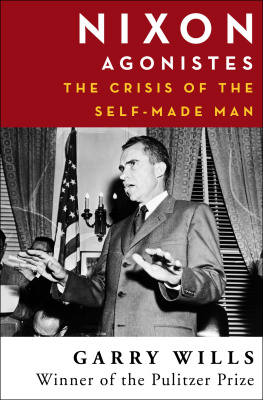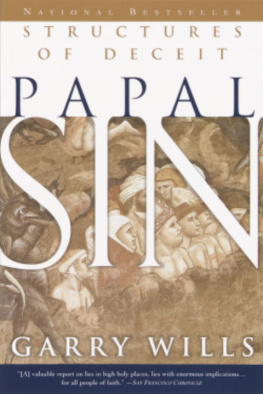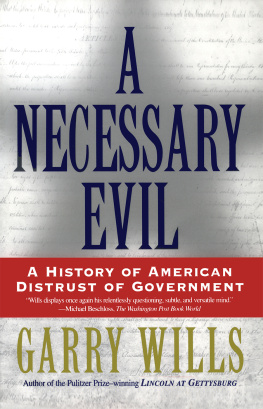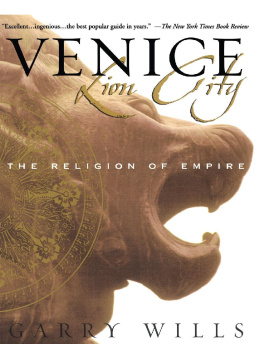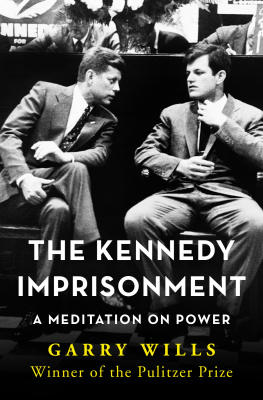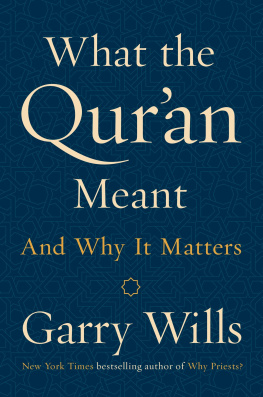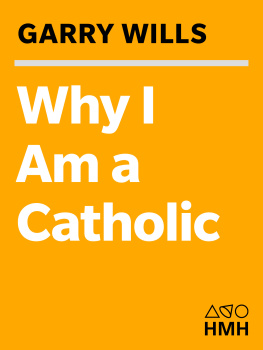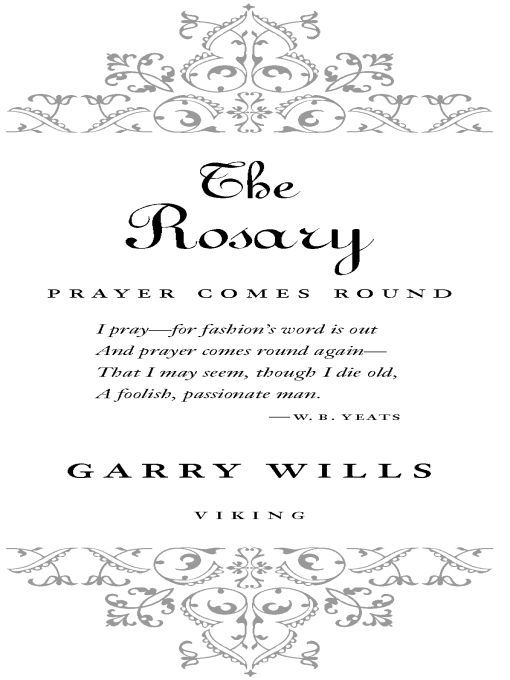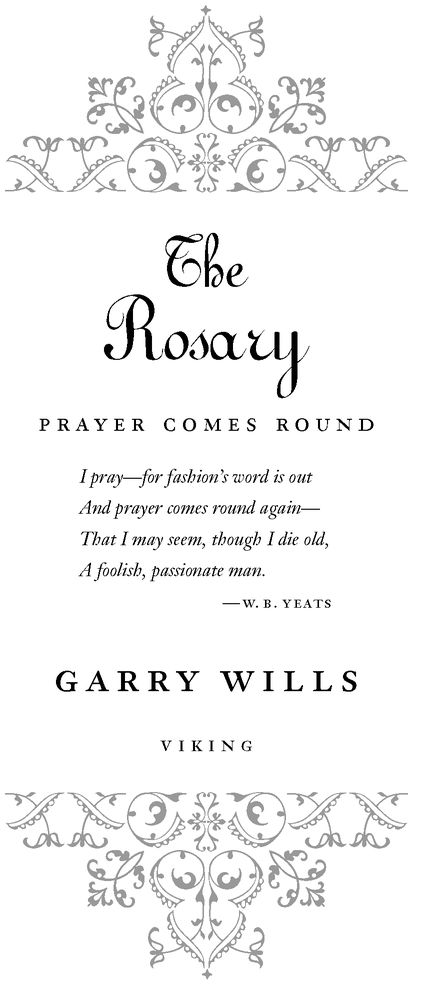Table of Contents
ALSO BY GARRY WILLS
Saint Augustine (Penguin Lives)
Saint Augustines Childhood
Saint Augustines Memory
Saint Augustines Sin
Saint Augustines Conversion
To Dick Cusack
master of the revels
All translations, except from the Hebrew, are by the author. Passages in Hebrew come from the New English Bible.
Acknowledgments
For securing rights to the Tintoretto illustrations, I thank John C. Wills, of Feldman Associates. I feel special gratitude to my editor Carolyn Carlson and my agent Andrew Wylie. For keeping faith alive in a dark time I turn to the Sheil Catholic Center and to my fellows there, Dick and Nancy Cusack.
Introduction
TIMELY AND TIMELESS
FOR CATHOLICS who grew up before the Second Vatican Council, saying the rosary, privately or with others, was a regular part of our lives. But in recent years the rosary has come to be stigmatized, precisely, as preconciliaras theologically retrograde, a bit of folk Catholicism, a thing to be dismissed. I think that is not only regrettable but surprising. In one way the rosary is both very timely and also timeless. Timely, because meditation is something many people feel a need for today, and the rosary has long filled that need. In bookstores we find volume after volume that tells us how to seek inner peace by contemplation, by regular time-outs from the press of worldly concerns, by exercises that collect oneself within oneself, that lift ones spirit toward a higher plane of consciousness. According to Pope John Paul II, the rosary has long answered this need for contemplation:
The West is now experiencing a renewed demand for meditation, which at times leads to a keen interest in aspects of other religions.... Much in vogue among these approaches are methods aimed at attaining a high level of spiritual concentration by using techniques of a psychological, repetitive, and symbolic character. The rosary is situated within this broad gamut of religious phenomena. (28)
The rosary is timely because people increasingly long for quiet and regeneration.
A discovery of the importance of silence is one of the secrets of practicing contemplation and meditation. One drawback of a society dominated by technology and the mass media is the fact that silence becomes increasingly difficult to achieve. Just as moments of silence are recommended in the liturgy, so too in the recitation of the rosary it is fitting to pause briefly after listening to the word of God, while the mind focuses on the content of a particular mystery. (31)
But the rosary is also timelessit uses an ancient and widespread aid to contemplation, the rhythmic repetition of prayers said on a string of beads (the very word bead comes from the old Anglo-Saxon term for prayer, bede). This practice is found in Hindu, Buddhist, and Islamic prayer life, as well as in Christian history. The objection sometimes made to the rosary, that it is a mechanical exercise, misses the point of such bead disciplines. Changing the rhythm of ones life, freeing the mind to move in a different way, involves slowing down the tempo of thought, entering a stalled state. That is why religious ceremony of almost every kind involves incantatory, repetitious, stylized actions.
It is true that the rosary as it was said in the past could work against contemplative patternswhen it was rattled off as a formula to be got over, was recited to get the indulgence, or performed with others as a communal duty. But that was a distortion of the practice, which left its essence untouched. It is a form of prayer in which repetitions should be breathed in a relaxed state, as Saint Ignatius recommended. Pope Paul VI said, By its nature the recitation of the rosary calls for a quiet rhythm and a lingering pace. (47)
The rosary is more complexly articulated than some forms of bead praying. It involves the saying of four prayers in a certain combinationcreed, Our Father, Hail Mary, doxology (Glory be...)and this combination can be orchestrated, as it were, in four different ways, reflecting four sets of subjects for contemplation (four sequences of gospel mysteries), each mystery dwelt on while one repeats the Hail Mary on each of ten beads (a decade). If this sounds complex in a printed description, it is very easy in practiceafter all, Catholics of my generation learned to do it early in grade school.
The mysteriesthe subjects of contemplation that one moves through as one says each subdivision of beadsare related aspects of Christs life: five glad events, five sad events, five teaching events, and five glorious events. Catholics have sometimes (and sometimes rightly) been said to neglect the Bible. But contemplating the New Testament episodes while saying the rosary is a way of remedying that situation. Our meditations are meant to be not merely an escape from self, but an entry into the life of Christ. We Christians believe that we are incorporated into the risen life of Jesus, as members of his mystical body. The Spirit prays in us, through Christ, to the Father. Saint Paul says, My life is no longer mine, but Christs in me (Galatians 2.20). And Colossians 3.3 says, Secretly you live with Christ in God. The rosary invites us to retire into that secret of our deeper life in Christ, to reflect on his actions and their private meaning for us, and to do this at our own pace, seeking our own peace.
An objection naturally poses itself: If our meditations are on the life of Christ, why is the most repeated prayer in the rosary said to the Virgin Mary? The Hail Mary, as used while contemplating the life of Christ, is properly a prayer for assistance in understanding that life. Pope John Paul again: Although the repeated Hail Mary is addressed directly to Mary, it is to Jesus that the act of love is ultimately directed, with her and through her (26). Mary is a perfect model for this, since the gospel presents her as mystified by her own son, trying patiently to probe the meaning of his actions.
When the angel Gabriel greets her as Highly Favored, she is stunned (dietarachth) and tries to puzzle out (dielogizeto) what it can mean (Luke 1.29).
After the wondrous events surrounding Christs birth, it is said: She kept these things for inner scrutiny [synetrei], sifting them [symballousa] in her heart (Luke 2.19).
At the presentation of Jesus in the temple, when Simeon prophesies the mission of Jesus, Mary and Joseph were astounded [thaumazontes] at what was being said about him (Luke 2.33).
Mary is not only surprised but hurt when the boy Jesus goes off for five days without telling her. She and Joseph are dumbfounded (exeplagsan), and she expresses her disappointment: How, my son, could you treat us this way? (Luke 2.48). When Jesus says he has a duty to a higher Father, Mary and Joseph did not understand [synkan] what he told them (Luke 2.50)but his mother kept all he said for close scrutiny [dietrei] in her heart (Luke 2.51). Father Raymond Brown notes that the verb for observe (trein) used in 2.19 and 2.51 means to keep a close or wary watch on.
At the wedding in Cana, Jesus apparently rejects Marys request that he help the people who have run out of wine: Woman, why is your worry mine?My time is not yet come. She does not know what he means. All she can say to the servants is: Whatever thing he tells you, do that (John 2.5).



